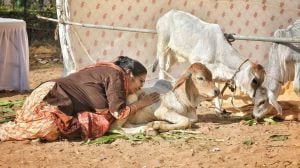Make room for women
Another Women8217;s Day is upon us and political parties continue to play games with the sentiments of women by promising to pass the Women...

Another Women8217;s Day is upon us and political parties continue to play games with the sentiments of women by promising to pass the Women Reservation Bill providing for 1/3rd of seats in Parliament and legislatures, but always failing to do so. It is common knowledge that the Bill has not been passed because of the hopeful but illogical assumption by women activists that male parliamentarians will help ensure that it is passed. Those very same male members who are expected to pass it are not so public spirited as to voluntarily abdicate the ground from under their own feet.
I believe there is an alternative and harmonious solution to facilitate the passing of this Bill. The UK has over 600 members of Parliament. The present strength of Lok Sabha can legitimately be raised by one-third, as recently suggested Home Minister Shivraj Patil, thus ensuring that one-third seats are reserved for women. This will also address the further objection by male MPs that the reservation of seats for women would mean the rotation of seats at every general election, with the result that members will not able to nurse the constituency for any great length of time. We can overcome this problem if a third of the total seats in Parliament/legislatures are made double-member male-female constituencies. This would ensure that inevitably one third of MPs/MLAs will be women without in any manner affecting the present strength of male seats.
The law of double-member constituencies prevailed up to the 1957 general election for general and reserved candidates. An interesting situation arose in the general election of 1957, when the late V.V. Giri 8212; who contested a parliamentary seat from a double-member constituency 8212; could not be declared elected because one scheduled tribe candidate got more votes than him, with the result that reserved candidates were declared elected to both the general and reserved seats. The same analogy would ensure that in a double member constituency, one woman will inevitably be declared elected as a matter of right, but it is possible that both the seats may go to women.
In case there is a double-member constituency, the question of rotation of the constituency every general election will also not arise because the same double-member constituency could legitimately be retained for at least two to three general elections.
The argument that the women8217;s quota will be monopolised by urban women is a red herring. There are over 200 OBCs in the Lok Sabha. It is a stark reality that it is not their public service but their caste configuration that had got them elected. Similar results will follow even after reservation for women. The only difference will be a big chink in the male bastion. That is the real reason for opposition by male MPs.
The suggestion of a sub-quota for backward and minorities in the women quota is constitutionally improper. Reservation of seats is guaranteed only for SC/STs in Article 330. The framers of the Constitution did not intend to further fragment legislatures on the basis of caste or religion. In the Poudyal case, the Supreme Court, while upholding the constitutionality of seat reservation for the Buddhist Sangha in the Sikkim legislature, has at the same time warned: 8220;It is true that the reservation of seats of the kind and the extent brought about by the impugned provisions may not, if applied to the existing states of the Union, pass constitutional muster.8221; It was emphasised that it would amount to discrimination because a person would be denied the right to be included in the rolls because of religious affiliation and would for similar reasons be ineligible to contest from that seat.
Women8217;s groups should not allow themselves to be divided by sub-quotas. A split in their ranks will only make it easier for males to retain their dominance and defeat the laudable objective of developing a women-oriented political agenda. Opponents of the Bill refuse to treat women as equals. It is this mindset that is sought to be destroyed by the Bill, which selfish politicians are resisting while pretending to fight for social justice.
In my view, the introduction of the Bill will unleash a powerful agent of social change. But, I am afraid, the strategy of women8217;s organisations has been somewhat faulty from the start. Holding seminars or lobbying political leaders in their offices or on television will not help. All women8217;s groups, irrespective of political affiliation, should form a common platform with a single agenda. It must become a mass social movement and send out a clear message to all political parties that failure to support the Bill will have serious consequences for the political fortunes of the parties.
Women activists have a ready-made army in the over one million women panchayat members. Let this instrument be sharpened and made effective to usher in a more gender just era in politics.
- 01
- 02
- 03
- 04
- 05































